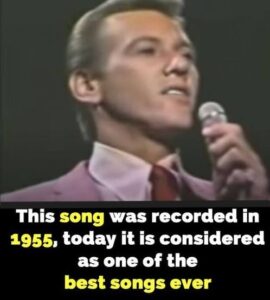THE 1955 SONG THAT STILL GIVES LISTENERS GOOSEBUMPS—THE VOICE, THE PASSION, THE LEGEND

When composer Alex North and lyricist Hy Zaret created “Unchained Melody” in 1955, it was simply meant to support a small prison drama called Unchained. No one imagined that the movie would disappear while its theme song would rise to breathtaking, timeless heights. Nearly seventy years later, the song has become one of the most performed love ballads in history, recorded more than 670 times around the world. It long ago stopped belonging to a single film—today, it belongs to the world.
The first versions of the melody carried a quiet sorrow, but everything changed in 1965 when The Righteous Brothers released their interpretation. Produced by Phil Spector and delivered by Bobby Hatfield’s astonishing vocals, that recording became the definitive version. Hatfield’s voice soared effortlessly, filled with longing and vulnerability, turning the simple arrangement of piano and strings into something that felt almost spiritual. People didn’t just listen—they felt it. To this day, just a few opening notes are enough to awaken memories, emotions, and chills.
Then came 1990. When Ghost hit theaters, the song was reborn once again. The unforgettable pottery scene between Patrick Swayze and Demi Moore, backed by The Righteous Brothers’ recording, became one of Hollywood’s most iconic romantic moments. A new generation fell in love with a melody first written decades earlier, and the song surged back up the charts worldwide.
Elvis Presley also cemented the song’s legendary status. Late in his career, when he was often tired but still mesmerizing, Elvis would sit at the piano during live shows and deliver a version of “Unchained Melody” that was heartbreakingly intimate. His performance carried the weight of everything he had lived—fame, passion, struggle, and deep emotion. For many fans, it remains one of the most moving moments of his final years on stage.
Since then, artists from every corner of the music world—across styles, generations, and languages—have taken a turn at the classic. Whether in a lush orchestral setting or played softly on an acoustic guitar, each cover unveils another layer of emotion. LeAnn Rimes, U2, Gareth Gates, and many others have offered their own interpretations, yet the song’s core remains untouched: yearning, devotion, and the quiet pain of love stretched across distance.
Its words are simple, almost deceptively so. “Oh, my love, my darling, I’ve hungered for your touch” speaks to a universal ache all humans understand. Paired with the sweeping melody, the lyrics feel both intimate and eternal. They express the hope that love can endure separation—and the fear that it might not.
In the end, “Unchained Melody” outgrew its origins and became something larger than any film, any decade, or any trend. It’s woven into the fabric of romance itself. Whether played on a crackling vinyl record, drifting through late-night radio, or echoing through a movie theater, it unfailingly stirs something deep inside the heart.
After nearly seven decades, its power remains untouched. The song still teaches us one simple truth:
to love is to long—and longing is what keeps love alive.
That is why its melody remains forever unchained.